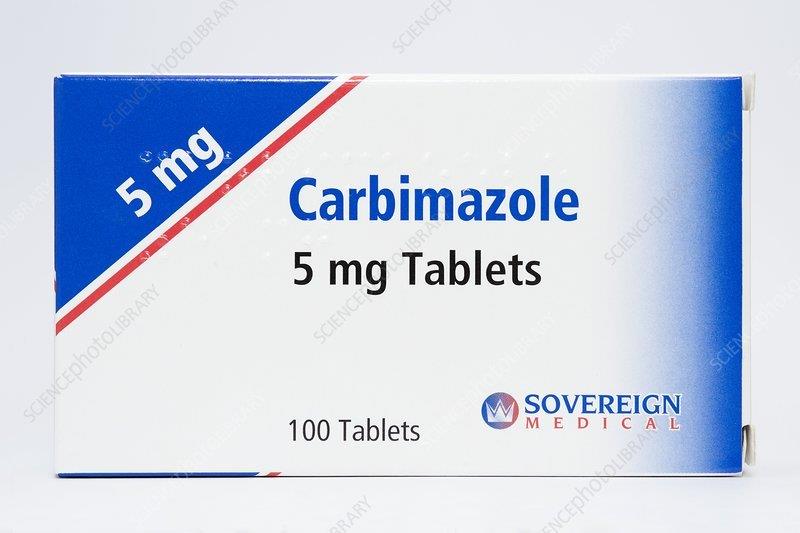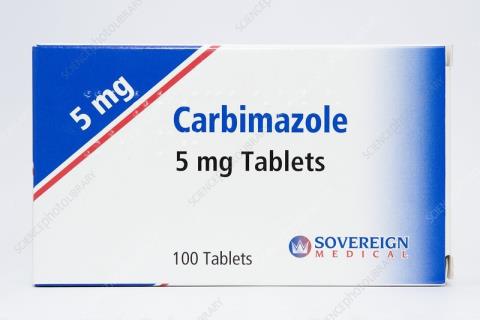What is Carbimazole? What is Carbimazole used for? What should be noted about possible side effects while taking the drug? Let's take a closer look at SignsSymptomsList about Carbimazole in the article analyzed below!
Active ingredient : Carbimazole
Drugs with similar active ingredients :
content
1. What is Carbimazole?
- Carbimazol is an antithyroid drug, a thioimidazole derivative (sulfur imidazole).
- In the body, carbimazol is rapidly and completely converted to thiamazol, so the mechanism of action of carbimazol is also that of thiamazol.
- It works by inhibiting thyroid hormone synthesis by preventing iodine from binding to the tyrosyl moiety of thyroglobulin and also by inhibiting the fusion of two iodotyrosyl radicals to iodothyronin. However, the drug does not inhibit the effect of thyroid hormone that is formed in the thyroid gland or is present in the circulation, does not inhibit the release of thyroid hormone brought in from the outside.
- Therefore, carbimazol is not effective in toxicity due to thyroid hormone overdose.
- Note, if the thyroid gland has a relatively high iodine level, it may be due to previous iodine use or radioactive oid use for diagnostic purposes, the body will respond slowly to the drug.

2. Indications of the drug
- Carbamizole helps to treat symptoms of hyperthyroidism (including Gaves-Basedow disease).
- In addition, the drug is used to treat thyroid problems before surgery for hyperthyroidism, until the basal metabolism is normal, in order to prevent attacks of thyrotoxicosis that may occur with partial thyroidectomy.
- Not only that, carbamizole helps in adjuvant therapy before and during radioactive iodine treatment until this therapy works to remove the thyroid gland.
- Treat thyrotoxicosis before iodized salt.
>> See more: Answers to frequently asked questions about hyperthyroidism
3. Carbimazole should not be used if
- Hypersensitivity to carbimazol or thioimidazole derivatives such as thiamazol.
- Do not use the drug on patients with cancer
- Subjects with myelosuppression, severe leukopenia.
- The patient has severe liver failure.
4. How to use Carbimazole effectively
4.1. How to use
- Carbimazol cannot treat the cause of hyperthyroidism, so if after taking the drug for 12 to 18 months (usually less than 24 months) the thyrotoxicosis persists, the thyroid must be removed or radioactive iodine used.
- Use exactly as directed by your doctor. If there is anything unclear, you should immediately contact your doctor for clarification.
- The drug should be taken with meals.
4.2. Dosage
- Adults are started at a dose of 15-40mg, up to 60mg/day divided into 3 times/day depending on the degree of mild, moderate or severe hyperthyroidism. However, it can also be used 1-2 times a day.
- Symptoms usually improve after 1-3 weeks, and thyroid function should return to normal after 1-2 months. When the patient's thyroid function returns to normal, the dose is gradually reduced, until the lowest dose and still maintains normal thyroid function. Usually, the maintenance dose is 5-15mg/day depending on the patient.
- In case of dose adjustment for maintenance, it should be noted: + Maintain with too low a dose,
hyperthyroidism
reappears or worsens
TSH, increased goiter volume.
- The duration of treatment is usually 12-18 months.
- Children use the starting dose of 0.25mg/kg/time x 3 times/day. Then adjust the dose according to the clinical response.
5. Side effects of drugs
- Allergies, skin rash, itching.
- Nausea, vomiting, digestive disorders.
- Leukopenia is usually mild to moderate.
- Headache, moderate and transient fever.
- The state of marrow failure, agranulocytosis manifests as severe fever, chills, throat infection, cough, sore mouth, hoarse voice. It is more common if you are elderly or taking high doses.

One of the side effects of the drug is an allergic reaction, a rash on the skin.
- Decreased blood prothrombin, causing hemolytic anemia.
- Joint pain, arthritis, muscle pain.
- Hair loss, red lupus syndrome.
- Cholestatic jaundice, hepatitis.
- Headache, mild fever, loss of taste, tinnitus, hearing loss.
- Metabolism: High doses and prolonged use can cause hypothyroidism, increase the volume of goiter.
6. Interaction occurs when taking Carbimazole drug
- Aminophyllin, oxtriphylin, theophylline, cardiac glycosides, beta-blockers.
- Amiodarone, iodoglycerol, iodine or potassium iodide.
- Coumarin or indandion-derivative anticoagulants.
- Radioactive iodine 131I: Antithyroid drugs can reduce the absorption of 131I by the thyroid gland; Absorption of 131I may increase again 5 days after abrupt discontinuation of antithyroid drugs.
7. Notes when using Carbimazole drug
- Must be prescribed by a specialist and monitored throughout the course of treatment.
- WBC count and white blood cell count should be monitored prior to initiating therapy, and weekly for the first 6 months of treatment because severe myelosuppression and leukopenia may occur. Special attention should be given to close monitoring in patients who are elderly or taking doses of 40 mg/day or more.
- Monitor prothrombin time before and during treatment if bleeding is observed, especially before surgery.
- In addition, extreme caution should be exercised when carbimazol is administered to patients taking drugs known to cause agranulocytosis.
8. Special Uses
8.1. Driving and operating machinery
- Carbamizole may cause dizziness, drowsiness, or fatigue.
- Therefore, it should be used with caution on subjects that require high concentration when working as mentioned above.
8.2. Pregnant
- Thiamazol, the active metabolite of carbimazol, crosses the placenta, so it may cause harm to the fetus (goiter, hypothyroidism, some birth defects). However, if the dose is taken, the actual risk that the drug poses is also low.
- When carbimazol is administered, the lowest effective dose should be used to maintain maternal thyroid function within the normal range of normal pregnancy, particularly during the third trimester.
- Some points to note:
+ Hypothyroidism and goiter in the fetus often occur when taking antithyroid drugs near the due date, because the fetal thyroid gland does not produce hypothyroid hormone until 11 or 12 weeks of pregnancy. period.
+ In the case that hyperthyroidism may decrease in the mother as the pregnancy progresses, the dose of carbimazol can be reduced in some people, sometimes stopping treatment for 2-3 months before delivery.
- Therefore, it is necessary to carefully weigh the benefits and risks before deciding to use the drug.
>> Refer to the article: Is it safe to use drugs during pregnancy?
8.3. Breastfeeding Women
- Thiamazol, a metabolite of carbimazol, is excreted in human milk and may cause complications for the infant, because the concentrations of thiamazol in serum and breast milk are approximately equal.
- However, in case the mother needs to use the drug, she must use the lowest effective dose and must not breastfeed after taking the drug for 4 hours.
- To be on the safe side, if the mother is taking the drug, she should not breast-feed.

The drug should not be used while breastfeeding.
9. Treatment of Carbimazole overdose
- High doses and prolonged use of carbimazol will cause many undesirable effects as mentioned in the section Undesirable effects, but more serious, especially the condition
+ Bone marrow failure.
+ Agranulocytosis.
In particular, it can lead to increased TSH, hypothyroidism, and increased goiter volume.
- Therefore, it is necessary to take care with medical measures, treat symptoms, possibly use antibiotics or corticosteroids, blood transfusion if bone marrow failure and severe leukopenia.
10. What to do when you miss a dose of Carbimazole
- Use as soon as you remember that you have missed a dose.
- If the missed dose is close to the next dose. Skip the missed dose and follow the dosing schedule.
- Do not take a double dose to make up for the missed dose.
11. How to preserve
- Keep Carbimazole out of reach of children and pets.
- Store the medicine in a cool, dry place. Avoid exposure to direct light or keep Carbimazole in humid places.
- The best storage temperature is < 30="">
Above is information on the use of Carbimazole. Call your doctor immediately if you have any unusual symptoms so that they can be treated and supported promptly!
Pharmacist Nguyen Ngoc Cam Tien













